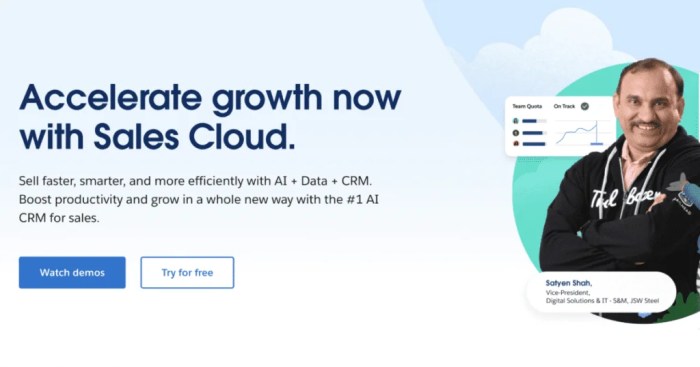Decoding the different types of Salesforce clouds for every business provides a roadmap for navigating the Salesforce ecosystem. Understanding the strengths and weaknesses of each cloud—Sales Cloud, Service Cloud, Marketing Cloud, and more—is crucial for businesses seeking to maximize their ROI. This exploration dives into the core functionalities, target audiences, and ideal use cases of each cloud, empowering you to choose the right solution for your specific needs.
We’ll examine how to select the optimal Salesforce cloud based on your business type and goals, and delve into the integration strategies that enable seamless communication across different Salesforce Clouds. Furthermore, we’ll explore the unique considerations for each cloud, providing insights into their specific features and use cases, and discuss future trends in cloud services.
Introduction to Salesforce Clouds
Salesforce provides a suite of cloud-based applications that help businesses manage various aspects of their operations, from sales and marketing to customer service and more. These applications, often referred to as “Salesforce Clouds,” are interconnected and designed to work seamlessly together, creating a comprehensive platform for businesses of all sizes. Understanding the distinct functionalities and target audiences of each cloud is crucial for leveraging Salesforce’s capabilities effectively.The different Salesforce Clouds are not standalone products but rather integrated components of a larger ecosystem.
Each cloud offers specialized tools and functionalities tailored to specific business needs, such as sales management, customer support, or marketing campaigns. The key is recognizing which cloud aligns with a particular business process and then utilizing its features to achieve the desired outcomes.
Overview of Salesforce Clouds
The Salesforce platform comprises various clouds, each addressing different business functions. Sales Cloud focuses on sales processes, Service Cloud handles customer service, Marketing Cloud manages marketing campaigns, and more. These clouds are not isolated; they can interact and share data, fostering a unified view of customers and streamlining business operations.
Sales Cloud
Sales Cloud is a cornerstone of Salesforce, designed to streamline the sales process. Its core functionalities include lead management, opportunity tracking, forecasting, and sales analytics. This enables businesses to effectively manage their sales pipeline, track leads from initial contact to closing, and forecast future revenue. Sales Cloud helps businesses improve sales efficiency and identify potential growth areas.
By providing a centralized platform for managing sales activities, Sales Cloud allows sales teams to collaborate effectively, reducing redundancies and ensuring a consistent sales approach.
Service Cloud
Service Cloud is specifically geared towards enhancing customer service and support. Key features include case management, knowledge base access, customer support ticketing systems, and live chat capabilities. This enables businesses to respond to customer inquiries and resolve issues efficiently, fostering stronger customer relationships and loyalty. By providing a centralized platform for managing customer interactions, Service Cloud empowers support teams to resolve issues quickly and provide consistent customer experiences.
Marketing Cloud
Marketing Cloud empowers businesses to engage with customers through various channels. Its features cover email marketing, social media marketing, advertising campaigns, and lead nurturing. These capabilities enable businesses to build and execute effective marketing campaigns, segment their customer base, and track the performance of their marketing initiatives. Marketing Cloud helps businesses understand customer preferences and tailor marketing efforts to resonate with their target audience.
Comparison of Salesforce Clouds
| Cloud Type | Target Audience | Key Features | Use Cases |
|---|---|---|---|
| Sales Cloud | Sales teams, businesses focused on lead generation, and sales management | Lead management, opportunity tracking, forecasting, sales analytics | Lead qualification, sales process automation, order management |
| Service Cloud | Customer service departments, support teams, businesses focused on customer interaction | Case management, knowledge base, customer support, live chat | Customer support ticketing, issue resolution, knowledge sharing |
| Marketing Cloud | Marketing teams, businesses focused on customer engagement | Email marketing, social media marketing, advertising campaigns, lead nurturing | Building and executing marketing campaigns, customer segmentation |
Choosing the Right Salesforce Cloud for Your Business: Decoding The Different Types Of Salesforce Clouds For Every Business
Picking the perfect Salesforce cloud for your business is crucial for maximizing its potential and achieving your strategic goals. It’s not just about selecting a platform; it’s about choosing a solution that seamlessly integrates with your existing workflows, empowers your team, and drives growth. This involves a careful assessment of your business needs, your current processes, and the specific functionalities each cloud offers.
A well-chosen cloud can dramatically enhance your efficiency, improve customer experience, and ultimately boost your bottom line.Understanding your business requirements is the cornerstone of successful Salesforce implementation. A deep dive into your current processes, pain points, and future aspirations is paramount. What are your key objectives? Are you looking to streamline sales, enhance customer service, or boost marketing effectiveness?
Figuring out the best Salesforce cloud for your business can be tricky. Understanding the nuances of each cloud—Sales Cloud, Service Cloud, Marketing Cloud, etc.—is key. But to truly optimize your strategy, consider how Google and AI content, like google and ai content , can enhance your Salesforce implementation. Ultimately, knowing how to effectively leverage Salesforce with AI and data insights is critical for any business looking to stay ahead of the curve.
Identifying these priorities will help narrow down the ideal Salesforce cloud for your unique circumstances. Consider the scale of your operations, the complexity of your data, and the size of your team. A tailored approach will ensure the solution effectively supports your needs, rather than overwhelming your resources.
Assessing Your Business Needs and Goals
Thorough assessment of your business needs and goals is vital for a successful Salesforce implementation. Consider your current processes, potential pain points, and future aspirations. Are you seeking to streamline sales, elevate customer service, or enhance marketing campaigns? Clearly defining these priorities is essential to selecting the right cloud. Analyze the volume of data you handle, the size of your team, and the complexity of your operations.
These factors will inform the most appropriate cloud solution for your business.
Aligning the Chosen Cloud with Your Business Strategy
The chosen Salesforce cloud should be deeply integrated into your overall business strategy. A strategic alignment ensures that the platform effectively supports your goals, drives growth, and fosters a cohesive approach across all departments. Evaluate how the chosen cloud will enhance your current processes, streamline workflows, and improve decision-making. The cloud should not be an add-on but an integral part of your business strategy.
This alignment ensures maximum value and efficiency.
Use Cases for Different Salesforce Clouds
Different Salesforce clouds excel in various business scenarios. Understanding these use cases is key to selecting the optimal platform. Sales Cloud is ideal for managing sales processes, leads, and opportunities, particularly for businesses with complex sales cycles. Service Cloud excels in customer service, enabling efficient handling of support requests and improving customer satisfaction. Marketing Cloud is a powerful tool for targeted campaigns, enabling businesses to engage customers effectively.
Commerce Cloud is specifically designed for e-commerce businesses, allowing for seamless integration with online stores and managing complex order fulfillment processes. Salesforce Platform is a versatile option for custom development, enabling businesses to create tailored solutions that meet unique requirements.
Ideal Salesforce Cloud for Different Business Types
The table below illustrates how different business types can benefit from specific Salesforce Clouds:
| Business Type | Ideal Salesforce Cloud | Rationale |
|---|---|---|
| E-commerce company | Sales Cloud, Commerce Cloud | Streamlines sales processes, integrates with online stores, manages complex order fulfillment. |
| Customer service-oriented company | Service Cloud | Handles customer support efficiently, offers robust case management, improves customer satisfaction. |
| Enterprise-level company | Salesforce Platform | Supports complex workflows, custom development, and scalability for large businesses. |
| Marketing-focused company | Marketing Cloud | Enables targeted campaigns, email marketing, and personalized customer engagement. |
Integrating Salesforce Clouds

Unlocking the full potential of Salesforce requires seamless integration between its various clouds. This integration allows businesses to leverage data and functionality across different departments and processes, creating a unified view of their operations and fostering a more efficient workflow. By connecting Sales Cloud with Service Cloud, for instance, customer interactions are streamlined, leading to enhanced customer satisfaction.Integrating Salesforce clouds goes beyond simply connecting them; it’s about creating a cohesive system that empowers businesses to act on insights and data in real-time.
Understanding the various Salesforce clouds can be tricky, but knowing which one best suits your business needs is crucial. For instance, local businesses often benefit from leveraging social media marketing strategies to reach their target audience, which can be greatly aided by the right Salesforce tools. Social media marketing for local businesses can be seamlessly integrated with Salesforce to boost customer engagement and sales.
Ultimately, deciphering the Salesforce cloud landscape is key to achieving optimal business results.
This approach enhances data visibility, automates processes, and ultimately drives better business outcomes. A well-integrated Salesforce environment is a powerful engine for growth and efficiency.
Methods for Integrating Salesforce Clouds
Different methods are available for integrating Salesforce clouds, each with its own strengths and weaknesses. Choosing the right method depends on the specific needs and complexity of the integration. A thorough understanding of the desired outcomes and the technical capabilities of each method is crucial for success.
| Integration Method | Description | Use Cases |
|---|---|---|
| API Integration | Connecting via application programming interfaces (APIs) allows for automated data transfer and real-time updates between different Salesforce clouds. This method leverages pre-built connectors and often requires less custom development. | Automated data synchronization between Sales Cloud and Marketing Cloud for targeted campaigns, or transferring customer data from Service Cloud to a custom CRM for enhanced analysis. |
| Custom Development | Creating custom applications using Apex, Visualforce, or other development tools allows for a highly tailored integration, catering to specific business needs and workflows. This method offers greater flexibility but typically requires significant development effort. | Integrating Salesforce with legacy systems, building complex custom workflows between clouds, or developing integrations that don’t have pre-built solutions. |
| Salesforce Integration Tools | Using third-party tools to bridge the gap between Salesforce clouds. These tools often streamline the integration process and reduce development time. | Integrating Salesforce with external applications, such as e-commerce platforms or marketing automation tools. These solutions often provide pre-built connectors and integrations. |
Benefits of Cloud Integration, Decoding the different types of salesforce clouds for every business
Integration across Salesforce clouds offers significant advantages for businesses. These benefits are realized through improved data visibility, streamlined processes, and better decision-making.
- Enhanced Data Visibility: A unified view of customer data across all Salesforce clouds provides a holistic understanding of customer interactions, from initial contact to post-sales support. This consolidated view empowers businesses to personalize interactions and tailor experiences effectively.
- Streamlined Processes: Integration automates workflows between clouds, eliminating manual data entry and reducing errors. This automation boosts efficiency and frees up employees to focus on higher-value tasks. For example, automatically transferring leads from Marketing Cloud to Sales Cloud.
- Improved Customer Experience: A seamless customer journey across all Salesforce clouds leads to a more personalized and efficient customer experience. This, in turn, increases customer satisfaction and loyalty. Consider the case where a customer service representative has access to all relevant customer data in real-time, leading to quicker and more effective resolution of issues.
Best Practices for Salesforce Cloud Integration
Successful integration requires careful planning and execution. Adhering to best practices ensures a smooth transition and minimizes potential issues.
- Define Clear Objectives: Clearly articulate the goals of the integration before beginning the implementation. This includes identifying the specific data to be transferred, the desired workflows, and the expected outcomes.
- Thorough Testing: Rigorous testing is essential to ensure the integration works as intended. Testing should cover various scenarios, including edge cases, to identify and resolve any potential problems.
- Security Considerations: Data security should be a top priority throughout the integration process. Implement robust security measures to protect sensitive information and comply with relevant regulations.
Examples of Successful Integrations
Several industries have successfully integrated Salesforce clouds to achieve significant improvements in their operations. These examples highlight the diverse applications and benefits of cloud integration.
- Retail: A retail company integrated their Sales Cloud with Service Cloud to improve customer support response times and gather comprehensive customer data. This enhanced customer satisfaction and improved sales forecasting.
- Financial Services: A financial institution integrated their Salesforce clouds to create a 360-degree view of their clients. This enabled personalized financial planning and improved client retention.
Cloud-Specific Considerations
Choosing the right Salesforce cloud isn’t just about picking a platform; it’s about aligning your business needs with the unique strengths of each cloud. Understanding the specific features and functionalities of each cloud, like Sales Cloud’s pipeline management or Service Cloud’s customer support capabilities, is crucial for optimal results. This section dives into the considerations for each Salesforce cloud, highlighting their respective strengths and how they can address diverse business requirements.Salesforce offers a suite of clouds, each tailored to specific business functions.
Each cloud has its own set of advantages and disadvantages. This section details important considerations for each, helping you make an informed decision. Understanding these unique features allows businesses to maximize the value of their Salesforce investment.
Figuring out the right Salesforce cloud for your business can be tricky, but understanding the different types is key. Knowing which cloud best suits your needs is crucial for success. While we’re on the topic of streamlining online processes, did you know that preventing spam signups for your WordPress newsletter is vital? Learning how to do this effectively is important, and this helpful guide on how to prevent newsletter signup spam in WordPress provides actionable steps.
Ultimately, choosing the right Salesforce cloud is about finding the perfect fit for your specific business needs, just like ensuring your newsletter signups are clean and efficient.
Sales Cloud: Managing the Sales Pipeline
Sales Cloud is the cornerstone of many businesses, focused on sales force automation and pipeline management. It provides tools for lead management, opportunity tracking, forecasting, and more. The strength of Sales Cloud lies in its ability to centralize and streamline the sales process, ensuring every lead and opportunity is managed effectively.
- Lead Management: Sales Cloud excels at capturing and qualifying leads. Features like lead scoring and automated workflows help prioritize high-potential leads and route them to the appropriate sales representatives. This streamlined process improves lead conversion rates and accelerates the sales cycle.
- Opportunity Management: Detailed opportunity tracking allows for accurate forecasting and sales performance analysis. Sales Cloud’s dashboards and reports give sales teams a clear picture of their progress and areas for improvement, enabling them to optimize their strategies.
- Sales Forecasting: Accurate sales forecasting is crucial for effective resource allocation and budget planning. Sales Cloud’s robust forecasting tools provide data-driven insights into future sales performance, enabling proactive planning and better decision-making.
Service Cloud: Customer Relationship Management
Service Cloud empowers businesses to deliver exceptional customer service. Its capabilities range from case management and knowledge bases to self-service portals. Understanding Service Cloud’s features is key to improving customer satisfaction and retention.
- Case Management: Service Cloud efficiently manages customer inquiries and issues. Automated routing and escalation procedures ensure timely resolution, reducing customer wait times and improving satisfaction.
- Knowledge Management: A comprehensive knowledge base allows customers to find answers to common questions independently, reducing the workload on support agents and improving response times.
- Customer Support Analytics: Service Cloud provides valuable insights into customer interactions, enabling businesses to identify trends and areas for improvement in their support processes. This allows for more efficient allocation of resources and proactive issue resolution.
Marketing Cloud: Driving Customer Engagement
Marketing Cloud focuses on targeted campaigns and customer engagement. Its tools for email marketing, social media marketing, and more, empower businesses to connect with customers effectively. Its use of data analytics is crucial for success.
- Targeted Campaigns: Segmentation and targeting capabilities in Marketing Cloud allow businesses to personalize communications and improve engagement rates.
- Multi-Channel Marketing: Marketing Cloud facilitates marketing campaigns across various channels, including email, social media, and mobile, enabling a holistic customer engagement strategy.
- Real-Time Customer Interaction: The cloud helps track customer interactions in real time, enabling businesses to provide personalized experiences and enhance customer satisfaction.
Other Clouds: Specific Focus Areas
Beyond these core clouds, Salesforce offers specialized clouds for different business needs, including Commerce Cloud for e-commerce, Platform Cloud for custom development, and others. Each specialized cloud provides specific functionalities tailored to unique business requirements.
Future Trends in Salesforce Clouds

The Salesforce ecosystem is constantly evolving, driven by advancements in technology and the ever-changing needs of businesses. Understanding these emerging trends is crucial for organizations looking to leverage Salesforce effectively and stay ahead of the curve. This section explores some key future trends impacting Salesforce Clouds, from AI integration to enhanced automation, and their potential to revolutionize business processes.The future of Salesforce clouds is intertwined with the rapid evolution of technologies like Artificial Intelligence (AI), Machine Learning (ML), and the Internet of Things (IoT).
These advancements are poised to reshape how businesses operate, offering unprecedented opportunities for efficiency, personalization, and data-driven decision-making. Integrating these technologies into Salesforce platforms will lead to more sophisticated and intuitive solutions for diverse business needs.
Emerging Technologies Impacting Salesforce Clouds
Several emerging technologies are significantly impacting Salesforce Clouds. These include the increasing use of AI-powered tools for automation and insights, enhanced integration with other cloud platforms, and the expanding role of IoT data in driving business decisions.
- Artificial Intelligence (AI) and Machine Learning (ML): AI and ML are rapidly transforming various industries, and Salesforce clouds are no exception. AI-powered tools are enabling more sophisticated automation of tasks, providing deeper insights into customer behavior, and personalizing interactions to enhance customer experiences. Examples include AI-driven lead scoring, predictive analytics for sales forecasting, and intelligent chatbots for customer service.
- Enhanced Cloud Integrations: The need for seamless data exchange between different platforms is driving the development of more robust integration capabilities within Salesforce clouds. Businesses are increasingly relying on integrations with other cloud-based applications, like CRM systems, ERP systems, and marketing automation tools. This integration fosters a unified view of customers and operations, leading to improved collaboration and decision-making.
- The Rise of IoT Data: The Internet of Things (IoT) is generating vast amounts of data from connected devices. Salesforce clouds are increasingly equipped to collect, analyze, and leverage this data to gain valuable insights into customer behavior and operational efficiency. For example, data from smart devices can provide real-time feedback on product usage, allowing businesses to improve product design and customer support.
Predictions for Future Developments and Advancements
Predicting the exact nature of future advancements is challenging, but several trends point to exciting developments. Businesses should anticipate greater personalization, enhanced automation, and increased focus on data security and compliance.
- Hyper-Personalization: Salesforce clouds will likely feature even more sophisticated personalization capabilities, enabling businesses to tailor interactions to individual customer needs and preferences. This will result in higher customer satisfaction and improved conversion rates.
- Advanced Automation: Expect more sophisticated automation tools within Salesforce clouds. These tools will further streamline business processes, reduce manual effort, and free up employees for higher-value tasks.
- Data Security and Compliance: With the increasing volume of data handled by Salesforce clouds, data security and compliance will become paramount. Expect more robust security measures and greater emphasis on adherence to industry regulations.
Examples of Advancements Improving Business Processes
Advancements in Salesforce clouds are already improving various business processes. Consider how a retail company can use AI-powered tools to predict customer demand, optimize inventory management, and personalize product recommendations. These advancements lead to higher efficiency and profitability.
- Enhanced Customer Service: AI-powered chatbots can provide instant customer support, answering common questions and resolving issues promptly. This improves customer satisfaction and reduces wait times.
- Improved Sales Efficiency: Predictive analytics within Salesforce clouds can help sales teams identify high-potential leads and tailor sales strategies to individual customer needs, ultimately boosting sales performance.
- Streamlined Operations: Integration with other cloud platforms allows for a unified view of customer interactions, streamlining processes across departments and improving overall efficiency.
Importance of Staying Informed About Future Trends
Staying informed about future trends in cloud services is critical for organizations using Salesforce clouds. Keeping abreast of advancements will allow companies to adapt to changes, capitalize on opportunities, and avoid potential pitfalls.
- Competitive Advantage: Companies that proactively adapt to emerging technologies gain a significant competitive advantage by optimizing processes and enhancing customer experiences.
- Strategic Planning: Understanding future trends allows businesses to strategically plan investments and resource allocation to maximize the value of their Salesforce cloud implementations.
Summary
In conclusion, decoding the different Salesforce clouds offers a powerful tool for businesses seeking to leverage the full potential of this robust platform. By understanding the specific functionalities of each cloud, businesses can effectively align their technology with their unique needs, optimize their processes, and gain a competitive edge in the market. This detailed overview equips you with the knowledge to confidently navigate the Salesforce landscape and make informed decisions about cloud adoption and integration.






